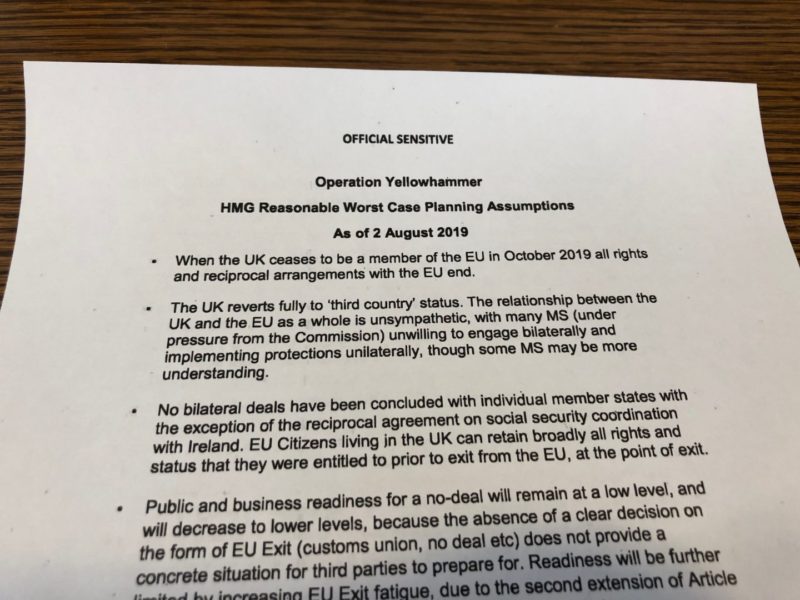Paul Blomfield A strong voice for Sheffield Central
Last night, Parliament voted to take back control of our business in order to stop a no deal Brexit. In today’s Star, I’ve explained why this is so important. You can read my article below.

As Parliament wrestles with the Government to block a ‘no deal’ Brexit, people are right to ask what it’s all about and why it matters so much.
Boris Johnson claims he is implementing the decision of the 2016 referendum, but leave voters were promised a deal. The ‘Vote Leave’ website pledged “a UK-EU Treaty that enables us to continue cooperating in many areas just as now” and Campaign Chair Michael Gove said “no-one is seriously arguing that Britain would be outside that free trade area, that tariff barriers would be erected and that Britain’s manufacturing goods would be at a disadvantage”.
But that’s exactly what we’re facing now. Boris Johnson says he will take the UK out of the EU on 31st October whatever the cost. He is paying lip-service to reaching a deal but refusing to talk to the EU about one. He’s surrounded himself by an extreme faction from his party, for whom Brexit is just a stepping stone to bigger change.
They want a “bonfire of regulations” that protect workers, consumers and the environment, along with tax cuts to big companies and the wealthy. They see the EU as the barrier to their vision and a ‘no deal’ departure is their favoured option – despite all the promises.
It didn’t have to be like this. When I closed the debate that Theresa May opened on her deal back on 5th December I said that she should have been straight with the British people, by saying that the very close referendum vote of 52:48 was a decision that we should no longer be members of the EU but was not a mandate to rupture relations with our nearest neighbours and most important trading partners.
We could have reached a deal – on the single market, customs union and agencies we’ve built together – which would have been supported by MPs and brought together our divided country. Instead she set red lines, boxed herself in a corner, and deepened the divisions in Parliament and the country.
People are right to be frustrated as the issue has dragged on over three years. Everyone wants politics to move beyond Brexit and sort out housing, the NHS, social care, the climate emergency and other big issues. So walking away from the mess – deal or no deal – seems tempting.
But leaving without a deal won’t be the end of Brexit. Every major country has a trading deal with its nearest neighbours. We’ll be no exception. We’ll have to negotiate lots of separate agreements on everything from fighting crime to importing medicines. The issue won’t go away, it will continue to dominate our lives.
Over 45 years we have built a close relationship with shared institutions, common rules, and agreed ways of trading. Ripping it all up without agreement will cause confusion and uncertainty, as the status quo disappears without a bridge to a new relationship.
It won’t necessarily mean overnight collapse, although there are risks of food and medicine shortages as the Government’s own plans have revealed but leaving without a deal will cause deep damage. It’s why the Government is putting aside billions of pounds to compensate farmers and big business – using money desperately needed by our schools and hospitals.
The Treasury’s analysis that the economy would shrink by 10% is backed by a report from Sheffield City Region Local Enterprise Partnership that a ‘no deal’ Brexit would result in the loss of 5,000 local jobs within months, and would make South Yorkshire’s economy 11% smaller by 2030.
The steel industry has said ‘no deal = no steel’, because half their exports go to the rest of Europe and international law would require the EU to impose 25% tariffs. ‘Make UK’, which represents 20,000 engineering and manufacturing companies has said it would be “economic lunacy”. Our universities, on which tens of thousands of Sheffield jobs depend, have warned that ‘no deal’ is the biggest threat they have ever faced.
Shoppers would be hit by a rise in import tariffs and a fall in the number of lorries coming into the UK, increasing food prices by up to 10% according to the Bank of England. Supermarkets have said that ‘no deal’ in October is particularly bad because their warehouses are full approaching Christmas, limiting their ability to stockpile goods.
Concerned about medical shortages, the Government have given themselves powers to instruct pharmacists to supply different strength, quantity or forms of medicines to those prescribed to patients. Unable to fill nursing and care jobs with European staff, new deals are being sought with countries from India to the Philippines but will take time to agree.
Boris Johnson’s bumbling ‘can do’ spirit will come unstuck when hit with reality, but it won’t be him or his elite friends who’ll pay the price. The decisions taken over the next few weeks will shape everyone’s lives for generations to come, so everyone should have a say on what happens. A ‘no deal’ Brexit betrays both ‘leave’ and ‘remain’ voters.
Before the 2016 referendum, Boris Johnson argued for a ‘double referendum’ – with a vote to start the process of leaving the EU and another on the final outcome. Now he should give people that opportunity.
